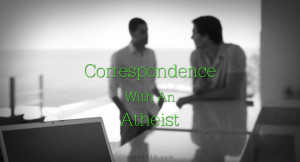
A correspondence with an Atheist.
Those of you who regularly interact with atheists may want to visit the blog Shadow To Light. It has some stimulating articles which engage and question atheism. One of these articles links to a correspondence between Albert W. Alschuler and an atheist acquaintance. The atheist’s position was that he had no need of metaphysics in his cosmos. But when a following email correspondence touched upon the atheist’s sense of duty, the Christian asked him three thought provoking questions concerning that sense of duty. Where does a sense of duty come from if there is no transcendent God? How does atheism reply?
Excerpt:
Seated next to me at dinner was a man about my age. Like me, he’d retired to Maine. We hit it off, and after our dinner, we began an email correspondence.
At the dinner, my friend said he admired a book I didn’t like, so I sent him a copy of a review of the book I’d written. The review tipped my friend off that I was a Christian.
His response made clear that he wasn’t. He wrote, “No metaphysics are needed in my cosmos, thanks.” Although he respected his religious friends, his own views were “close to the occasionally strident and at times rude Brother Dawkins [Richard Dawkins, the author of The God Delusion].” He noted, “We shall have some heavy lifting as workout buddies, you and I.”
I replied that a discussion of our religious differences probably would work better in a barroom than in an email exchange. “We could pretend to be college freshmen again, and it could be fun.” But my friend was not to be put off. He insisted that he had no need to “Godify the unknown or alleged unknowable.”
My new pen pal had sent me some of his writing about Acadia National Park. It spoke of “the profound responsibility of our consciousness: to use our understanding of nature to guide our conduct within nature,” and it added, “In this bloom of space-time, human reason can try to understand the development of all matter, from stars and galaxies to our own planet, fellow creatures, home island, and selves. It is our nature and duty to do so.”
I told him I agreed with these sentiments, but I wondered just why we had a duty to use our capacities for the various purposes he mentioned or, indeed, for any purpose at all.
I made it a multiple-choice question:
A) I made these duties up. If I hadn’t, they wouldn’t exist.
B) My culture made them up. I’m just a product of my culture.
C) These duties proceed from a source outside myself and my culture.
Some weeks after I posed my question, my friend apologized for not answering it. He asked me to stay tuned and promised, “I’ll give you a fair if not satisfying (for you) response to your multiple choice question—re-posed as I wish.”
But he never did. There could be other reasons for his failure of course, but I like to think I confounded him.
What might my friend have said?
Answer A (subjectivism—each of us a small godlet of values) fails badly. An ethical duty that you’ve made up is no duty at all. It’s a “just pretend” duty. Willing yourself into an ethical void can’t fill it. If the only duties you have are those you’ve made up, the other guy’s only duties are presumably the ones he’s made up, and he wants to make Acadia into a theme park. Moreover, answer A leaves you with no reason to ponder or reconsider your ethical views and no reason to try to make them consistent. Your judgments can’t be mistaken, because they’re not about anything.
Answer B (conventionalism—culture as the god of values) isn’t any better. Some of your convictions differ from those of other members of your culture; all of your ethical views don’t proceed from toadying up to other people. Moreover, like answer A, answer B leaves you with nothing to say to the other guy, who now tells you that his culture has taught him to value building a master race.
Read the rest HERE
